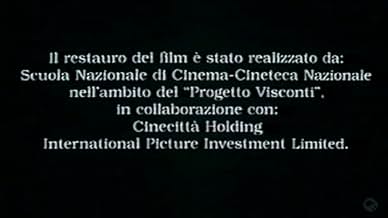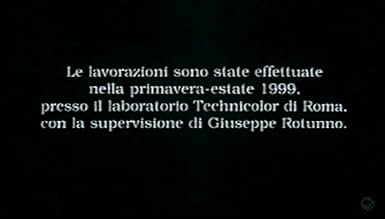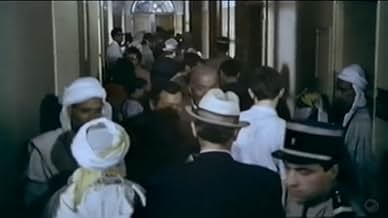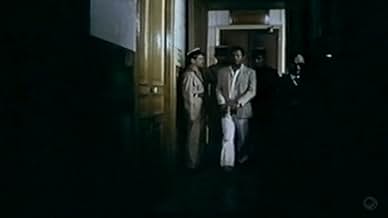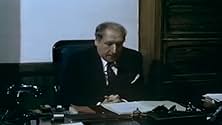IMDb-BEWERTUNG
7,1/10
3405
IHRE BEWERTUNG
In einer Atmosphäre politischer Spannungen, als die Franzosen Algier noch immer kontrollieren, wird ein Algerier am Strand getötet und ein Franzose, der sein ganzes Leben lang in Algier gele... Alles lesenIn einer Atmosphäre politischer Spannungen, als die Franzosen Algier noch immer kontrollieren, wird ein Algerier am Strand getötet und ein Franzose, der sein ganzes Leben lang in Algier gelebt hat, wegen dieses Mordes verhaftet.In einer Atmosphäre politischer Spannungen, als die Franzosen Algier noch immer kontrollieren, wird ein Algerier am Strand getötet und ein Franzose, der sein ganzes Leben lang in Algier gelebt hat, wegen dieses Mordes verhaftet.
- Auszeichnungen
- 4 Nominierungen insgesamt
Jean-Pierre Zola
- Employer
- (as Jean Pierre Zola)
Empfohlene Bewertungen
A naked room, a dead old woman lies on a wooden coffin, across the coffin we see her son. His head down, his face slightly contorted. We move in to notice with a chill that he's just trying to get some dirt from under his fingernails. Mersault. Visconti's Mersault inspired by Camus's Mersault. The film was attacked in its day and the Albert Camus's purists shouted blue murder or worse, they didn't say a word. Visconti knew what he was doing. He chose Marcelo Mastroianni to play Mersault. By that choice alone he was departing from Camus's intentions and yet, if you read the book today and see the film today, Mastroianni is Camus's Mersault. It is the driest of all Visconti films. His toughest. Mastroianni gives a performance that defies description. If you've seen more than once,"XXX" by choice, I don't promise you that you'll surrender, automatically, to the power of this film, but I can assure you that both films belong to the same Universe, yours, ours. Give it a try. Then, you tell me.
Luchino Visconti's sublime adaptation of Camus' "unfilmable" existentialist classic is all but forgotten. It's one of Visconti's best films, a searing, intelligent film. Marcello Mastroianni reportedly stepped into the role of Meurseult, which Visconti had earmarked for his protégé Alain Delon, who would have been too pretty to play the character. Mastroianni gives a masterful performance. As his mistress Maria Cardona, Anna Karina is stunning. She is especially moving in the courtroom scene. Giuseppe Rotunno's cinematography is peerless. Pauline Kael voted this as one of the top three films of 1967, after "Bonnie and Clyde" and "Chimes at Midnight". I hear that the reason why the movie isn't available on DVD or video is because of the rights. Hope this is rectified soon.
About as direct an adaptation from book to movie as you can get, this film version of Camus' famous novel by director Luchino Visconti raises interesting questions about the inherent difference between page and screen.
As much as Camus's first-person prose is included in the film in the form of voice-over, the fact remains that a movie can't get us inside the head of a character like a book can. This is highlighted all the more by the fact that Marcello Mastroianni is outstanding as Camus' Meursault, one couldn't ask for a better performance. Nonetheless, the sense one gets here of understanding (or not) Meursault's perspective pales to that of the novel.
On the other hand, even the most vivid prose cannot transport us to the physical reality of a time and place like a well made film. This version of The Stranger is as much about occupied Algeria in the early twentieth century as it is about Meursault or any of the philosophical questions that Camus was wrestling with in his novel. This version is more overtly political, literally showing the ways in which racism and colonialism shape the interactions of the characters.
As much as Camus's first-person prose is included in the film in the form of voice-over, the fact remains that a movie can't get us inside the head of a character like a book can. This is highlighted all the more by the fact that Marcello Mastroianni is outstanding as Camus' Meursault, one couldn't ask for a better performance. Nonetheless, the sense one gets here of understanding (or not) Meursault's perspective pales to that of the novel.
On the other hand, even the most vivid prose cannot transport us to the physical reality of a time and place like a well made film. This version of The Stranger is as much about occupied Algeria in the early twentieth century as it is about Meursault or any of the philosophical questions that Camus was wrestling with in his novel. This version is more overtly political, literally showing the ways in which racism and colonialism shape the interactions of the characters.
The stranger is very famous novel of the French literature writen by Albert Camus who tells the story of the murder of a man and then the arrest and the trial of his murderer.To adapt this novel for the cinema is a great challenge , at first sight the story seems easy to understand, but later we can hardly understand why Arthur Meursault killed the young Arab , why he doesn't try to defend himself.
The film directed by Luchino Visconti is really a good adaptation of that novel and Marcello Mastroianni 's performance is excellent.
Inspired by Albert Camus' seminal work of 1942, one is hardly likely to see a more faithful or indeed reverential adaptation than this.
It is easy to get bogged down in discussions as to whether or not Camus' piece is Existentionalist. He himself denied this and it is probably safer to say that if anything, it represents the philosophy of the Absurd.
The novel is written as a first person narrative by the 'Stranger' of the title although I have always felt the alternative title of 'The Outsider' to be far more appropriate. Arthur Meursault by name, he is the sheikh of apathy and his total indifference is evident in both his manner and such utterings as "It doesn't really matter" or "It makes no difference one way or the other." He cannot bring himself to show any grief at his mother's funeral and reacts impassively to his adoring girlfriend's suggestion of marriage. He is even unable to give a reason for his apparently motiveless shooting of an Arab other than "I think it was the sun." He simply does not behave as society dictates he ought and for his inability to play the game he pays the ultimate penalty.........
I cannot agree with the view that Marcello Mastroianni is miscast in the role. He had previously worked with Visconti in the cruelly underrated 'Le Notte Bianchi' of 1957 and during the intervening years he had become the finished article and excelled for Fellini, Antonioni, Bolognini, Germi and de Sica. Very few actors convey blankness or lassitude quite as well as he which makes his final rant against the religious platitudes of the prison chaplain so dramatically effective. By all accounts he lobbied for the role and turns in a splendid performance.
Visconti is the most 'operatic' of directors which is why he seems an odd choice for this austere, almost Bresson-esque material. He has of course the services of a fine cast, notably a touching Anna Karina as Meursault's lover, Georges Geret as a pimp, Bernard Blier as Meursault's feeble defence lawyer, Georges Wilson as an evangelical examining magistrate and Bruno Cremer as the prison chaplain.
The sun-baked imagery and oppressive heat are wonderfully captured by Visconti's chosen cinematographer Giuseppe Rotunno whilst Piero Piccioni, much favoured by Bolognini, contributes one of his most offbeat scores.
This is not really to do with plot but is all about 'mood'. Both novel and film are pervaded by a sense of 'Ennui', that evocative word that covers so many negative emotions.
The ultimate challenge is to make a film about boredom without its being boring. Has Visconti succeeded? On balance, with minor reservations, I think he has.
It is easy to get bogged down in discussions as to whether or not Camus' piece is Existentionalist. He himself denied this and it is probably safer to say that if anything, it represents the philosophy of the Absurd.
The novel is written as a first person narrative by the 'Stranger' of the title although I have always felt the alternative title of 'The Outsider' to be far more appropriate. Arthur Meursault by name, he is the sheikh of apathy and his total indifference is evident in both his manner and such utterings as "It doesn't really matter" or "It makes no difference one way or the other." He cannot bring himself to show any grief at his mother's funeral and reacts impassively to his adoring girlfriend's suggestion of marriage. He is even unable to give a reason for his apparently motiveless shooting of an Arab other than "I think it was the sun." He simply does not behave as society dictates he ought and for his inability to play the game he pays the ultimate penalty.........
I cannot agree with the view that Marcello Mastroianni is miscast in the role. He had previously worked with Visconti in the cruelly underrated 'Le Notte Bianchi' of 1957 and during the intervening years he had become the finished article and excelled for Fellini, Antonioni, Bolognini, Germi and de Sica. Very few actors convey blankness or lassitude quite as well as he which makes his final rant against the religious platitudes of the prison chaplain so dramatically effective. By all accounts he lobbied for the role and turns in a splendid performance.
Visconti is the most 'operatic' of directors which is why he seems an odd choice for this austere, almost Bresson-esque material. He has of course the services of a fine cast, notably a touching Anna Karina as Meursault's lover, Georges Geret as a pimp, Bernard Blier as Meursault's feeble defence lawyer, Georges Wilson as an evangelical examining magistrate and Bruno Cremer as the prison chaplain.
The sun-baked imagery and oppressive heat are wonderfully captured by Visconti's chosen cinematographer Giuseppe Rotunno whilst Piero Piccioni, much favoured by Bolognini, contributes one of his most offbeat scores.
This is not really to do with plot but is all about 'mood'. Both novel and film are pervaded by a sense of 'Ennui', that evocative word that covers so many negative emotions.
The ultimate challenge is to make a film about boredom without its being boring. Has Visconti succeeded? On balance, with minor reservations, I think he has.
Wusstest du schon
- WissenswertesTwenty years before Visconti's adaptation, while Camus was still alive, the novelist had been approached with the idea of making The Stranger as a film by director Jean Renoir.
- Crazy CreditsThe restoration of the film was carried out by: the National Film School - National Film Library, as part of the 'Visconti Project' in collaboration with Cinecitta Holding International Picture Investment Limited. The work was carried out in the spring & summer 1999, at the Technicolor Laboratory in Rome, under the supervision of Giuseppe Rotunno.
- VerbindungenReferenced in Costumes from the Films of Visconti (1978)
Top-Auswahl
Melde dich zum Bewerten an und greife auf die Watchlist für personalisierte Empfehlungen zu.
- How long is The Stranger?Powered by Alexa
Details
- Erscheinungsdatum
- Herkunftsländer
- Sprachen
- Auch bekannt als
- The Stranger
- Drehorte
- Produktionsfirmen
- Weitere beteiligte Unternehmen bei IMDbPro anzeigen
Zu dieser Seite beitragen
Bearbeitung vorschlagen oder fehlenden Inhalt hinzufügen

